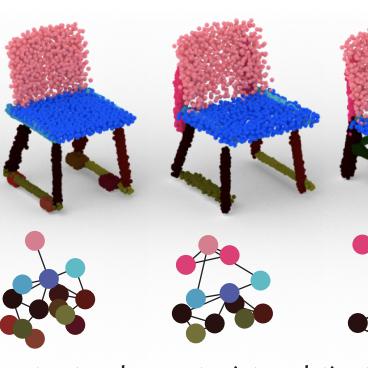Search Results for author: Peter W. Battaglia
Found 15 papers, 8 papers with code
Learned Force Fields Are Ready For Ground State Catalyst Discovery
no code implementations • 26 Sep 2022 • Michael Schaarschmidt, Morgane Riviere, Alex M. Ganose, James S. Spencer, Alexander L. Gaunt, James Kirkpatrick, Simon Axelrod, Peter W. Battaglia, Jonathan Godwin
We present evidence that learned density functional theory (``DFT'') force fields are ready for ground state catalyst discovery.
ETA Prediction with Graph Neural Networks in Google Maps
no code implementations • 25 Aug 2021 • Austin Derrow-Pinion, Jennifer She, David Wong, Oliver Lange, Todd Hester, Luis Perez, Marc Nunkesser, Seongjae Lee, Xueying Guo, Brett Wiltshire, Peter W. Battaglia, Vishal Gupta, Ang Li, Zhongwen Xu, Alvaro Sanchez-Gonzalez, Yujia Li, Petar Veličković
Travel-time prediction constitutes a task of high importance in transportation networks, with web mapping services like Google Maps regularly serving vast quantities of travel time queries from users and enterprises alike.
Large-scale graph representation learning with very deep GNNs and self-supervision
1 code implementation • 20 Jul 2021 • Ravichandra Addanki, Peter W. Battaglia, David Budden, Andreea Deac, Jonathan Godwin, Thomas Keck, Wai Lok Sibon Li, Alvaro Sanchez-Gonzalez, Jacklynn Stott, Shantanu Thakoor, Petar Veličković
In doing so, we demonstrate evidence of scalable self-supervised graph representation learning, and utility of very deep GNNs -- both very important open issues.
Generating Images with Sparse Representations
1 code implementation • 5 Mar 2021 • Charlie Nash, Jacob Menick, Sander Dieleman, Peter W. Battaglia
The high dimensionality of images presents architecture and sampling-efficiency challenges for likelihood-based generative models.
Learning Mesh-Based Simulation with Graph Networks
11 code implementations • ICLR 2021 • Tobias Pfaff, Meire Fortunato, Alvaro Sanchez-Gonzalez, Peter W. Battaglia
Our model can be trained to pass messages on a mesh graph and to adapt the mesh discretization during forward simulation.
PolyGen: An Autoregressive Generative Model of 3D Meshes
1 code implementation • ICML 2020 • Charlie Nash, Yaroslav Ganin, S. M. Ali Eslami, Peter W. Battaglia
Polygon meshes are an efficient representation of 3D geometry, and are of central importance in computer graphics, robotics and games development.
Learning to Simulate Complex Physics with Graph Networks
12 code implementations • ICML 2020 • Alvaro Sanchez-Gonzalez, Jonathan Godwin, Tobias Pfaff, Rex Ying, Jure Leskovec, Peter W. Battaglia
Here we present a machine learning framework and model implementation that can learn to simulate a wide variety of challenging physical domains, involving fluids, rigid solids, and deformable materials interacting with one another.
Combining Q-Learning and Search with Amortized Value Estimates
no code implementations • ICLR 2020 • Jessica B. Hamrick, Victor Bapst, Alvaro Sanchez-Gonzalez, Tobias Pfaff, Theophane Weber, Lars Buesing, Peter W. Battaglia
In SAVE, a learned prior over state-action values is used to guide MCTS, which estimates an improved set of state-action values.
Object-oriented state editing for HRL
no code implementations • 31 Oct 2019 • Victor Bapst, Alvaro Sanchez-Gonzalez, Omar Shams, Kimberly Stachenfeld, Peter W. Battaglia, Satinder Singh, Jessica B. Hamrick
We introduce agents that use object-oriented reasoning to consider alternate states of the world in order to more quickly find solutions to problems.
Structured agents for physical construction
no code implementations • 5 Apr 2019 • Victor Bapst, Alvaro Sanchez-Gonzalez, Carl Doersch, Kimberly L. Stachenfeld, Pushmeet Kohli, Peter W. Battaglia, Jessica B. Hamrick
Our results show that agents which use structured representations (e. g., objects and scene graphs) and structured policies (e. g., object-centric actions) outperform those which use less structured representations, and generalize better beyond their training when asked to reason about larger scenes.
Relational Forward Models for Multi-Agent Learning
no code implementations • ICLR 2019 • Andrea Tacchetti, H. Francis Song, Pedro A. M. Mediano, Vinicius Zambaldi, Neil C. Rabinowitz, Thore Graepel, Matthew Botvinick, Peter W. Battaglia
The behavioral dynamics of multi-agent systems have a rich and orderly structure, which can be leveraged to understand these systems, and to improve how artificial agents learn to operate in them.
Relational inductive biases, deep learning, and graph networks
31 code implementations • 4 Jun 2018 • Peter W. Battaglia, Jessica B. Hamrick, Victor Bapst, Alvaro Sanchez-Gonzalez, Vinicius Zambaldi, Mateusz Malinowski, Andrea Tacchetti, David Raposo, Adam Santoro, Ryan Faulkner, Caglar Gulcehre, Francis Song, Andrew Ballard, Justin Gilmer, George Dahl, Ashish Vaswani, Kelsey Allen, Charles Nash, Victoria Langston, Chris Dyer, Nicolas Heess, Daan Wierstra, Pushmeet Kohli, Matt Botvinick, Oriol Vinyals, Yujia Li, Razvan Pascanu
As a companion to this paper, we have released an open-source software library for building graph networks, with demonstrations of how to use them in practice.
Relational inductive bias for physical construction in humans and machines
no code implementations • 4 Jun 2018 • Jessica B. Hamrick, Kelsey R. Allen, Victor Bapst, Tina Zhu, Kevin R. McKee, Joshua B. Tenenbaum, Peter W. Battaglia
While current deep learning systems excel at tasks such as object classification, language processing, and gameplay, few can construct or modify a complex system such as a tower of blocks.
Metacontrol for Adaptive Imagination-Based Optimization
1 code implementation • 7 May 2017 • Jessica B. Hamrick, Andrew J. Ballard, Razvan Pascanu, Oriol Vinyals, Nicolas Heess, Peter W. Battaglia
The metacontroller component is a model-free reinforcement learning agent, which decides both how many iterations of the optimization procedure to run, as well as which model to consult on each iteration.
Interaction Networks for Learning about Objects, Relations and Physics
7 code implementations • NeurIPS 2016 • Peter W. Battaglia, Razvan Pascanu, Matthew Lai, Danilo Rezende, Koray Kavukcuoglu
Here we introduce the interaction network, a model which can reason about how objects in complex systems interact, supporting dynamical predictions, as well as inferences about the abstract properties of the system.




